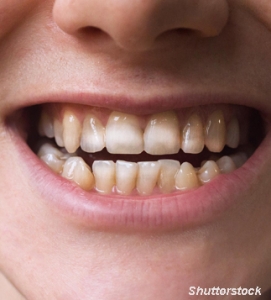Genetic Syndrome Shares Impact on Tooth Enamel with Celiac Disease
 The latest research from the Weizmann Institute of Science unveils a newly identified autoimmune disorder affecting tooth enamel development, providing valuable insights into the mysteries surrounding enamel irregularities.
The latest research from the Weizmann Institute of Science unveils a newly identified autoimmune disorder affecting tooth enamel development, providing valuable insights into the mysteries surrounding enamel irregularities.
Headed by Professor Jakub Abramson, the study investigates a rare genetic syndrome named APS-1 and its correlation with impaired enamel production.
Significantly, this disorder is also prevalent in children diagnosed with celiac disease, suggesting a broader link between autoimmune conditions and dental health.
- Weizmann Institute of Science, https://www.dentistrytoday.com 1
Tooth enamel, acknowledged as the toughest and most mineral-rich substance in the human body, plays a vital role in safeguarding teeth. However, the study reveals that one in ten individuals and a third of children with celiac disease exhibit defective enamel, heightening sensitivity to temperature changes and accelerating decay. 2
Despite the widespread occurrence of enamel issues, the specific causative factors remain elusive in many cases.
Published recently in Nature, the study delves into the autoimmune nature of enamel defects observed in APS-1 individuals. Given that APS-1 patients grapple with various autoimmune diseases, the researchers theorize that the enamel abnormalities may be autoimmune-related, indicating a potential immune system assault on proteins or cells crucial for enamel formation.
The investigation identifies a mutation in the autoimmune regulator (Aire) gene during the exploration of this mechanism. A key player in educating T cells, essential for averting autoimmune responses, the Aire gene mutation disrupts the critical process of instructing T cells to distinguish between the body’s own proteins and external substances. Consequently, T cells lacking proper education are released from the thymus gland, leading to the production of antibodies targeting enamel proteins.
- The study intriguingly draws parallels between APS-1 and celiac disease, a prevalent autoimmune disorder affecting approximately 1% of the Western population.
Significant numbers of celiac patients were found to possess autoantibodies targeting enamel proteins, akin to APS-1 cases. To comprehend this link, the study explores potential shared proteins between the intestine and dental tissue.
A noteworthy discovery arises from the focus on k-casein, a major component of dairy products.
- Milk from cows that contain a higher percentage of k-casein protein are sought after because this protein helps to speed the coagulation of milk into cheese. 3
The study reveals that antibodies against k-casein, generated in response to specific food antigens in the intestines of celiac patients, may inflict collateral damage on enamel development.
- Considering the widespread use of k-casein in dairy products, the study’s implications extend to the food industry.
Professor Abramson underscores the common occurrence of impaired tooth enamel development for unknown reasons among individuals.
- The study not only enhances our understanding of this phenomenon but also suggests the potential for diagnosing this newfound disorder through blood or saliva tests.
- Early diagnosis, especially in children, holds the promise of enabling preventive treatment for tooth enamel issues, potentially revolutionizing dental healthcare practices.
- In summary, this comprehensive study not only unravels the intricate connection between autoimmune disorders and tooth enamel defects but also carries implications for medical diagnosis and the broader food industry.
The study, “Autoimmune amelogenesis imperfecta in patients with APS-1 and coeliac disease,” was published November 2023 in Nature.
SOURCE: https://www.nature.com/articles/s41586-023-06776-0
- 1 https://www.dentistrytoday.com/emerging-autoimmune-syndrome-disrupts-the-formation-of-tooth-enamel
- 2 https://hurstpediatricdentistry.com/2021/03/09/dental-enamel-formation-and-defects-in-children
- 3 https://businesswales.gov.wales/farmingconnect/news-and-events/technical-articles/role-kappa-casein-cheese-making













